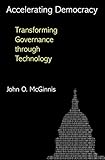Accelerating Democracy : Transforming Governance Through Technology / John O. McGinnis.
Material type: TextPublisher: Princeton, NJ : Princeton University Press, [2012]Copyright date: ©2012Edition: Core TextbookDescription: 1 online resource (224 p.) : 1 line illusContent type:
TextPublisher: Princeton, NJ : Princeton University Press, [2012]Copyright date: ©2012Edition: Core TextbookDescription: 1 online resource (224 p.) : 1 line illusContent type: - 9780691151021
- 9781400845453
- Communication in politics -- Technological innovations
- Democracy
- Democratization
- Information technology -- Political aspects
- Information technology -- Political aspects
- Technological innovations -- Political aspects
- Technological innovations -- Political aspects
- POLITICAL SCIENCE / General
- Internet
- administrative government
- artificial intelligence
- bias
- collective decision making
- computational advances
- computer
- cultural cognition
- democracy
- dispersed media
- earmarks
- education reform
- elections
- empirical analysis
- empiricism
- federalism
- friendly AI
- governance
- government data
- information age
- information costs
- information markets
- information technology
- innate majoritarian bias
- knowledge falsification
- machine intelligence
- majority rule
- modern technology
- political bias
- political campaigns
- political culture
- political decision making
- political information
- political life
- political prediction markets
- politics
- public action problem
- public policy
- regulation
- representation
- social governance
- social knowledge
- social planning
- social policy
- social science
- social-scientific knowledge
- special interests
- status quo
- technocracy
- technological acceleration
- technological change
- term limits
- 320.014 23
- JC423
- online - DeGruyter
- Issued also in print.
| Item type | Current library | Call number | URL | Status | Notes | Barcode | |
|---|---|---|---|---|---|---|---|
 eBook
eBook
|
Biblioteca "Angelicum" Pont. Univ. S.Tommaso d'Aquino Nuvola online | online - DeGruyter (Browse shelf(Opens below)) | Online access | Not for loan (Accesso limitato) | Accesso per gli utenti autorizzati / Access for authorized users | (dgr)9781400845453 |
Browsing Biblioteca "Angelicum" Pont. Univ. S.Tommaso d'Aquino shelves, Shelving location: Nuvola online Close shelf browser (Hides shelf browser)

|

|

|

|

|

|

|
||
| online - DeGruyter The Roman Market Economy / | online - DeGruyter Why Australia Prospered : The Shifting Sources of Economic Growth / | online - DeGruyter A Tale of Two Cultures : Qualitative and Quantitative Research in the Social Sciences / | online - DeGruyter Accelerating Democracy : Transforming Governance Through Technology / | online - DeGruyter Fighting for the Speakership : The House and the Rise of Party Government / | online - DeGruyter Of Empires and Citizens : Pro-American Democracy or No Democracy at All? / | online - DeGruyter Meeting at Grand Central : Understanding the Social and Evolutionary Roots of Cooperation / |
Frontmatter -- Contents -- Introduction -- Chapter one. The Ever Expanding Domain of Computation -- Chapter two. Democracy, Consequences, and Social Knowledge -- Chapter three. Experimenting with Democracy -- Chapter four. Unleashing Prediction Markets -- Chapter five. Distributing Information through Dispersed Media and Campaigns -- Chapter six. Accelerating AI -- Chapter seven. Regulation in an Age of Technological Acceleration -- Chapter eight. Bias and Democracy -- Chapter nine. De-biasing Democracy -- Conclusion. The Past and Future of Information Politics -- Acknowledgments -- Appendix -- Notes -- Index
restricted access online access with authorization star
http://purl.org/coar/access_right/c_16ec
Successful democracies throughout history--from ancient Athens to Britain on the cusp of the industrial age--have used the technology of their time to gather information for better governance. Our challenge is no different today, but it is more urgent because the accelerating pace of technological change creates potentially enormous dangers as well as benefits. Accelerating Democracy shows how to adapt democracy to new information technologies that can enhance political decision making and enable us to navigate the social rapids ahead. John O. McGinnis demonstrates how these new technologies combine to address a problem as old as democracy itself--how to help citizens better evaluate the consequences of their political choices. As society became more complex in the nineteenth century, social planning became a top-down enterprise delegated to experts and bureaucrats. Today, technology increasingly permits information to bubble up from below and filter through more dispersed and competitive sources. McGinnis explains how to use fast-evolving information technologies to more effectively analyze past public policy, bring unprecedented intensity of scrutiny to current policy proposals, and more accurately predict the results of future policy. But he argues that we can do so only if government keeps pace with technological change. For instance, it must revive federalism to permit different jurisdictions to test different policies so that their results can be evaluated, and it must legalize information markets to permit people to bet on what the consequences of a policy will be even before that policy is implemented. Accelerating Democracy reveals how we can achieve a democracy that is informed by expertise and social-scientific knowledge while shedding the arrogance and insularity of a technocracy.
Issued also in print.
Mode of access: Internet via World Wide Web.
In English.
Description based on online resource; title from PDF title page (publisher's Web site, viewed 30. Aug 2021)


